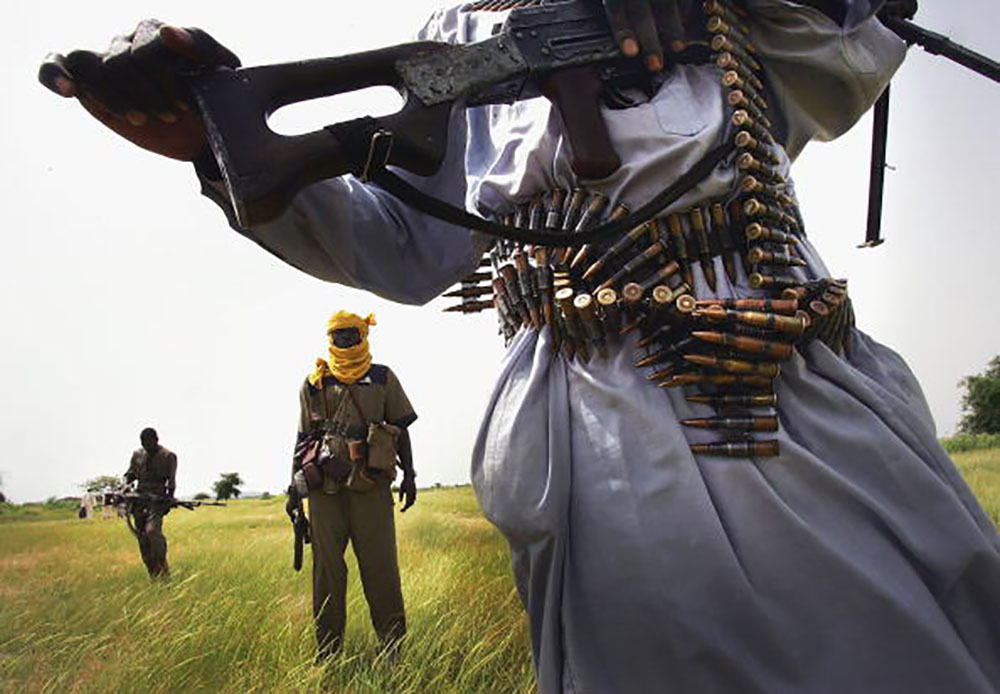
Sudan: The Flaring Militia Market Built by al-Bashir
By Yousif Hamad
If the persistence of war in Khartoum is the most fitting headline for the failure of regional and international diplomatic efforts, this failure did not begin on April 15, the day the war started. It has been brewing for years, and everyone must now deal with its consequences one way or another.
Over the past four years, following nearly a decade of the Arab Spring events, the streets of this giant capital were filled with burning tires and sniper rifles aimed at the bodies of peaceful revolutionaries demanding democracy and the establishment of a professional army away from politics.
Until then, Sudanese managed to steer their country away from the fate of that political spring leading to wars. But who was the leader who wanted the Sudanese military to stay out of politics and for democracy to flourish?
In reality, none of the regions leaders or neighboring countries were thrilled to see the Sudanese revolution achieve its goals, nor did they want to form a strategic alliance with these peaceful revolutionaries seeking democracy. On the contrary, obstacles quickly arose, and the country descended into a comprehensive war that shook many of its certainties.
Early in the life of the peaceful revolution, influential countries like Egypt, the UAE, and Saudi Arabia chose to align with the military and form alliances with them, insisting stubbornly on not understanding the demands of Sudanese politicians and civilians aspiring to a democratic system with balanced and neutral foreign relations. Some countries sought to continue the policies established by Omar al-Bashir, stemming from his limited choices, and perhaps aimed to deepen and perpetuate them. Among these policies was the investment in maintaining two armed forces in the country.
These investment policies were clear to the revolutionaries and political activists, and they protested against them at the time. For example, protesters in the sit-in square in May 2019 chanted against the Egyptian president, who showed his bias towards the military when he assumed the presidency of the African Union. At that time, the parties had not yet reached the Constitutional Document that the armys leader and the leader of the Rapid Support Forces overthrew with the help of elements of the defunct Muslim Brotherhood regime.
One year after the signing of the Constitutional Document in 2019, peaceful Sudanese revolutionaries became extremely disillusioned with the suspicious relations between the military and the rich Gulf countries.
Throughout history, Sudan has been referred to as the Land of Gold and Men for its influential Arab surroundings, and it does not appear that anything has changed. Since the 1970s, Sudan has been a market for militias, which the Omar al-Bashir regime excelled in creating, and Sudan has become a source of fighters and security guards fighting for money in Yemen and Libya.
Moreover, the European Union attempted to exploit the militia market created by Omar al-Bashir. In June 2016, the Omar al-Bashir government redeployed 400 vehicles belonging to the Rapid Support Forces in the northern state, and from there, these forces launched campaigns towards the Libyan borders, claiming at the time that they had captured 1,500 illegal migrants.
This event coincided with the European Union grant of 51 million to Sudan as part of the Khartoum Process project, designed to curb migration to Europe. At that time, the leader of the Rapid Support Forces himself acted as the projects executive agent.
How did al-Bashir build the militia market?
One of the misguided policies of the Omar al-Bashir regime was recruiting militants as the Popular Defense Forces. Initially, their ranks included students, university students, and activists from the Islamic movement. The primary purpose was to create military weight parallel to the Sudanese Armed Forces, which had a secular orientation.
For many years, the Omar al-Bashir regime believed firmly that militias were more efficient and cost-effective, whether their members were militants or nomads who had been cut off from modern life and state services. From the early years of his regime, Omar al-Bashir had cemented his belief that he was fighting enemies from abroad and within, namely the political opposition that opposed him. By this logic, he justified the use of violence by militias in suppressing peaceful protests, as happened in September 2013, for example.
The protraction of the Omar al-Bashir regime and its numerous wars helped him refine his experience in using militias, eventually leading to the creation of the Rapid Support Forces, which have been fighting the Sudanese army since April of last year. By the end of 2014, these forces had their own legal framework approved by the parliament of the al-Bashir regime.
Thus, al-Bashirs genius had given birth to the worst experiment in using non-state militias, empowering them with broad authority to use weapons against political opponents pushed to take up arms or against civilians in villages suspected of harboring rebels against the government. Denying their crimes was part of his logic.
Over the years, this cost-effective strategy has had clear advantages for al-Bashir. However, over time, its cost became heavier than ever before. These non-state militias, locally nurtured, have become more prominent than the regular armed forces monopolizing arms in the state he managed. While the ability of these militias to sustain themselves and reward themselves with spoils may seem less demanding than relying on the regular army, they have proven to be more costly in terms of financial and political demands. What are we waiting for from the slow diplomacy taking place in Jeddah?

